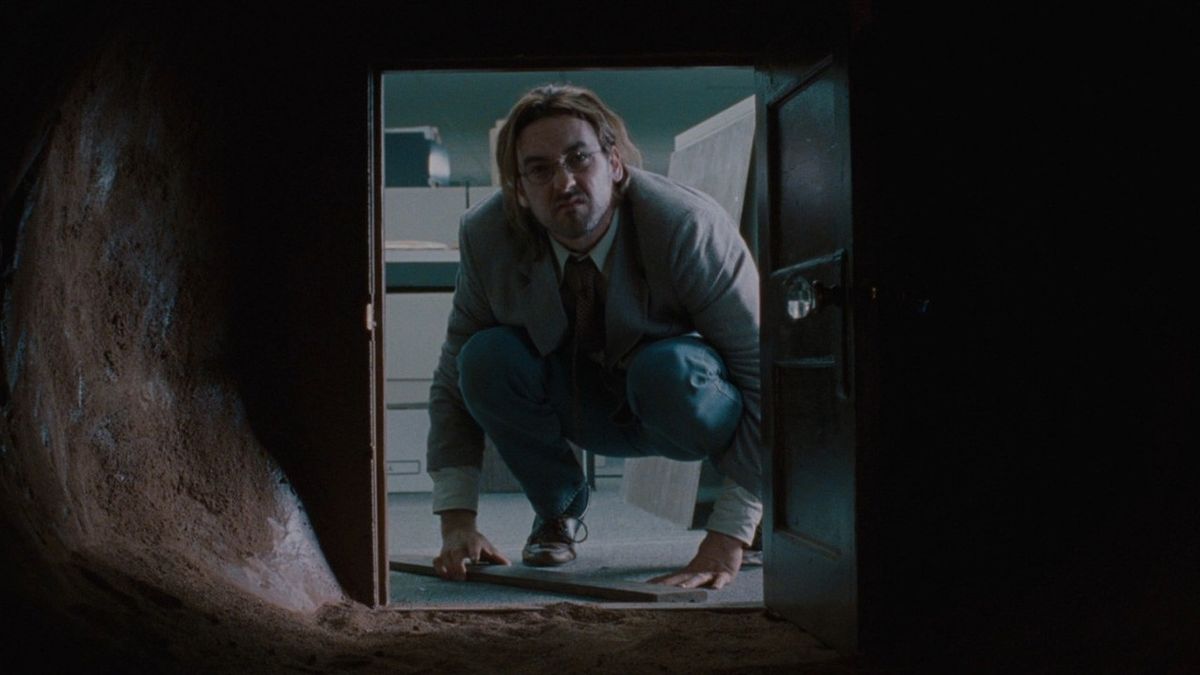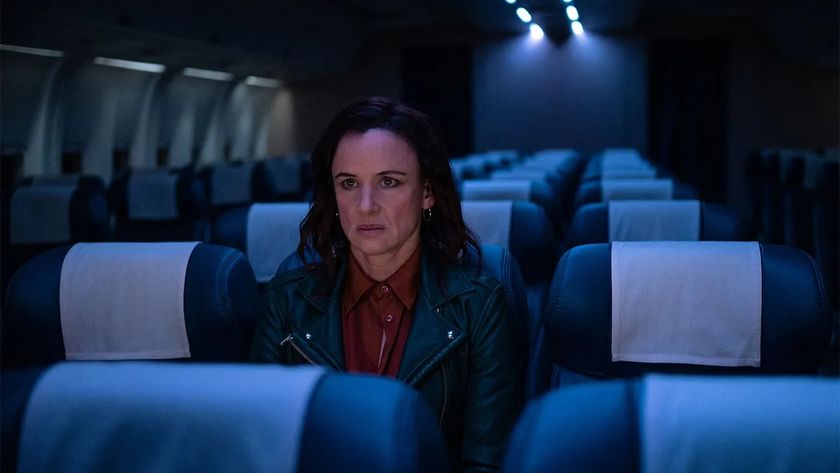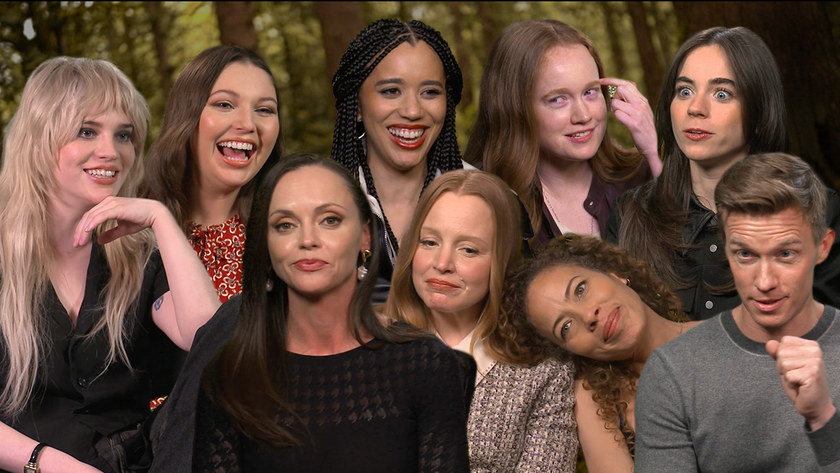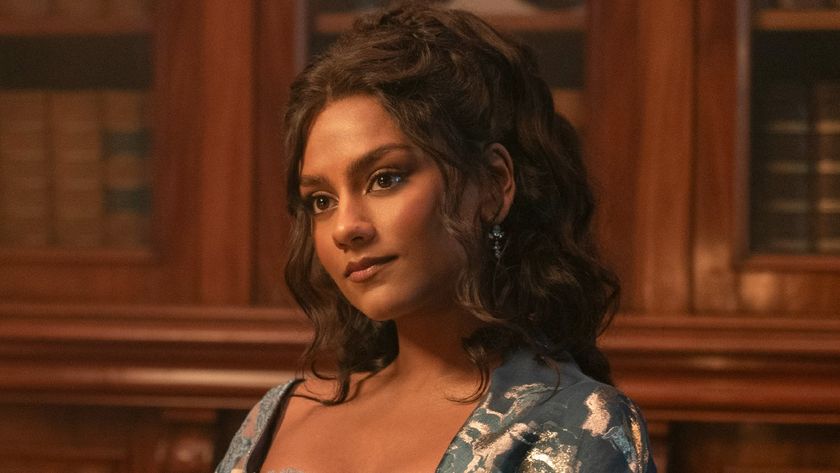Interview: Charlie Kaufman

It's very, very strange to hear Charlie Kaufman talk about his own brain. It's the brain that dreamed up Clementine Kruczysnki and Joel Barish. It imagined a portal into John Malkovich's mind, and transformed an adaptation of a book about orchids into a meditation on screenwriting, and a career resurgence for Nicolas Cage. Sitting in the same room with Kaufman, who outright refuses to explain the meaning of his screenplays, is both fascinating and frustrating; you want your own portal into his brain, just to get a few answers.
Kaufman's latest creations, including a house that's permanently on fire and a life-size replica of New York City contained within a warehouse, are all part of Synecdoche, New York, a movie he says is about death and illness but has a lot to say about life and art as well. He and Catherine Keener talked to a small group of journalists last week about their movie; Keener plays the wife of Philip Seymour Hoffman's character, who leaves him early on to pursue her art career in Berlin. Below is just Kaufman's part of the interview, though Keener chimes in a little toward the end. Even though he won't tell you what anything means, Kaufman still has plenty to say about his work, and actually comes right out and says it near the end: "God, I'm brilliant!" No, it's not quite what you think; but when it's Kaufman, isn't that always the case?
What was the motivation behind this? Was it the idea of exploring frustration or creativity?
No, actually not. I mean, it was really more about exploring things that are scary, and mortality, and illness, and regret, and time passing. I really wasn't thinking at all about the other thing.
When you sat down to edit, were you looking at a movie that was in some ways different from the movie you had in your head before you started production?
In some ways, yeah, and I think in some ways it's an inevitability. Before you start production, you have characters you have created without actors in mind, then all of a sudden you've got actors. They bring an enormous amount in creating these characters, and creating the dynamics between the characters that you've written. People ask me, even on other movies, did the movie come out as you imagined it when you wrote it? It's an impossible thing that it would, and I don't think you want it to.
Was everything that happens in the movie in the script?
CINEMABLEND NEWSLETTER
Your Daily Blend of Entertainment News
No that was in the script. That was in the script because the pieces that are in the movie need to be built-- literally and figuratively. We couldn't improvise that. We needed sets that were built. And it was very, very complicated conceptually for people working on the movie. We needed special graphs and charts and stuff to understand where we were at certain points. I can't imagine what it would have looked like [otherwise].
Can you talk about casting Emily Watson and Samantha Morton with each other? We were talking earlier about how a lot of people confuse them. Was it a kind of joke?
It wasn't a joke. It was based on my feeling about them, that there seems to be a place in my brain that they both occupy. I love them both, and they're actually very different, so it's hard to know why that is. What's come up out of this is that a lot of people have said this to me, since I've done it. I did it because I feel that way. Samantha told me after I cast Emily that she once got hired for a job, and she was at the table read, and the director told her how much he liked her in Breaking the Waves. The person who hired her. It was an awkward moment. When Emily came along-- they didn't know each other, so they met on this movie-- and apparently that confusion had existed in Emily's world as well.
Can you talk about the house on fire? [The house that Samantha Morton's character, Hazel, lives in is on fire throughout the entire movie]
There's symbolism and there are metaphors and there's that sort of stuff in the movie, and I don't explain why its there, because it's something for an audience member to interact with. During production, I had one of the people [working] on the movie who was so overwhelmed by that idea, that concept, and he felt it described his life. And when he told me why, it was like, that's interesting. It seemed almost obvious. And I loved it. And that's sort of the thing for me. This movie-- some of it's going to connect with you, some of it's not going to connect with you, perhaps. Based on who you are. And that's by design. Allowing you to have a different experience on the movie than the guy who worked on the crew. And that's what I'm hoping for. It's kind of like a projective test in a lot of ways for me. You know what projective tests are? Psychological tests-- Rorschach is a projective test. But there's also another projective test that I'm really attracted to, which is called a thematica perception test. I'm sure you've seen them. They're painted situations, a scene that's somewhat ambiguous. A man with his head in his hands, sitting on a couch, and a woman looking off. And the idea is you're shown this, and you're asked to explain what it means, and what you say it means is who you are.
What about the title? What made you use that word?
Synecdoche? The various things in the movie means something to me, and that's why I write them. I put them out in the world, and then they mean something to you or not, or different things to you, or the same things to you. My feeling is for me to come out at any point and say this is what the movie means, is really only my opinion.
That's not what I asked. It was about the title.
I know. But the title is something in the movie.The title, for me to say why I used synecdoche... I think if you read the definition of synecdoche, my sense is that a lot of it will make itself revealed, why I might have used it. At the same time, I had an interaction with the word synecdoche as a title for this movie a month ago. I was like, oh, really. In my head I was like, "God, I'm brilliant" But it was completely not something that I thought about. If I can do that, I was hoping other people can do that.
Do you feel like you really want to write more and direct, or do you want to see how it works as a director?
I want to write to direct now, in the immediate future. I did this thing and I learned an awful lot, and I want to go back and try again with what I've learned. And I liked it. I really like working with actors, and I also like the control that I have. Which isn't to say-- I had a lot of influence with both Spike and Michel. They were enormously collaborative with me. As a writer collaborating with someone else, I don't think I could have asked for a better situation. But it is different now, in that I have this, and I can do this, and I don't have to petition anybody. I think what it does is it makes the thing even more idiosyncratic. And I like that. I feel like I want to keep moving toward idiosyncracy. Personal, personal, personal.
Catherine Keener: And now you directly collaborate with the actors.
Charlie Kaufman: And now I directly collaborate with the actors, absolutely.
Catherine Keener: Which I really enjoyed from my perspective. I enjoyed working with Charlie directly. Because as the actor you always want to get to the writer.
Did you have that chance on Being John Malkovich?
Catherine Keener: Yes. Spike, as Charlie explained, was enormously generous with sharing the coveted writer.
Charlie Kaufman: Spike is a really collaborative person. It's one of his great traits as a person, and as a director, that he really does open himself up to anybody who wants to talk about anything. You don't disrespect him in any way.
Catherine Keener: You are as well, as a director. I don't know where that started, but it's always great for an actor to have a director's ear for as long as you want to talk at it. And Charlie would stay interested.
Staff Writer at CinemaBlend
Most Popular










